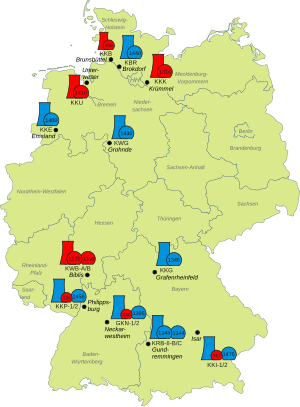
Nuclear energy policy is a national and international policy concerning some or all aspects of nuclear energy and the nuclear fuel cycle, such as uranium mining, ore concentration, conversion, enrichment for nuclear fuel, generating electricity by nuclear power, storing and reprocessing spent nuclear fuel, and disposal of radioactive waste. Nuclear energy policies often include the regulation of energy use and standards relating to the nuclear fuel cycle. Other measures include efficiency standards, safety regulations, emission standards, fiscal policies, and legislation on energy trading, transport of nuclear waste and contaminated materials, and their storage. Governments might subsidize nuclear energy and arrange international treaties and trade agreements about the import and export of nuclear technology, electricity, nuclear waste, and uranium.
Since about 2001 the term nuclear renaissance has been used to refer to a possible nuclear power industry revival, but nuclear electricity generation in 2012 was at its lowest level since 1999.[2] [3] Since then it had increased back to 2,653 TWh in 2021, a level last seen in 2006. The share of nuclear power in electricity production however is at a historic low and now below 10% down from a maximum of 17.5% in 1996.[4] Following the March 2011 Fukushima I nuclear accidents, China, Germany, Switzerland, Israel, Malaysia, Thailand, United Kingdom, and the Philippines are reviewing their nuclear power programs. Indonesia and Vietnam still plan to build nuclear power plants.[5][6][7][8] Thirty-one countries operate nuclear power stations, and there are a considerable number of new reactors being built in China, South Korea, India, and Russia.[9] As of June 2011, countries such as Australia, Austria, Denmark, Greece, Ireland, Latvia, Lichtenstein, Luxembourg, Malta, Portugal, Israel, Malaysia, and Norway have no nuclear power stations and remain opposed to nuclear power.[10][11]
Since nuclear energy and nuclear weapons technologies are closely related, military aspirations can act as a factor in energy policy decisions. The fear of nuclear proliferation influences some international nuclear energy policies.
- ^ IAEA (2011). "Power Reactor Information System".
- ^ "Nuclear power down in 2012".
- ^ "The Nuclear Renaissance (by the World Nuclear Association)".
- ^ url=https://www.worldnuclearreport.org/IMG/pdf/wnisr2022-v3-lr.pdf
- ^ Jo Chandler (March 19, 2011). "Is this the end of the nuclear revival?". The Sydney Morning Herald.
- ^ Aubrey Belford (March 17, 2011). "Indonesia to Continue Plans for Nuclear Power". New York Times.
- ^ Israel Prime Minister Netanyahu: Japan situation has "caused me to reconsider" nuclear power Piers Morgan on CNN, published 2011-03-17, accessed 2011-03-17
- ^ Israeli PM cancels plan to build nuclear plant xinhuanet.com, published 2011-03-18, accessed 2011-03-17
- ^ Michael Dittmar. Taking stock of nuclear renaissance that never was Sydney Morning Herald, August 18, 2010.
- ^ "Nuclear power: When the steam clears". The Economist. March 24, 2011.
- ^ Duroyan Fertl (June 5, 2011). "Germany: Nuclear power to be phased out by 2022". Green Left.